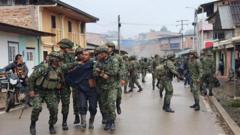Sánchez accused the EMC, a prominent rebel group, of orchestrating the kidnapping, stating that the locals acted under their orders. The situation escalated when the soldiers were surrounded by more than 100 individuals as they attempted to extract the arrested suspect. Subsequently, a second group of soldiers was also detained the following day in an even larger incident.
Historically, such instances have seen quick negotiations between local communities and humanitarian organizations, leading to the release of captives. However, in this case, the locals refused to communicate with intermediaries, prompting the Colombian military to deploy additional forces to the region. The operation resulted in the arrest of 20 individuals.
The military estimates that over 90% of the local population relies on coca cultivation for their livelihood, making the presence of military personnel perceived as a significant threat. The region has long suffered from the presence of multiple armed groups involved in extortion, illegal mining, and the drug trade, further complicating the already tense dynamics between the local community and the military.
As the situation unfolds, the Colombian government continues to grapple with the complexities of drug-related violence and community relations in the country.
Historically, such instances have seen quick negotiations between local communities and humanitarian organizations, leading to the release of captives. However, in this case, the locals refused to communicate with intermediaries, prompting the Colombian military to deploy additional forces to the region. The operation resulted in the arrest of 20 individuals.
The military estimates that over 90% of the local population relies on coca cultivation for their livelihood, making the presence of military personnel perceived as a significant threat. The region has long suffered from the presence of multiple armed groups involved in extortion, illegal mining, and the drug trade, further complicating the already tense dynamics between the local community and the military.
As the situation unfolds, the Colombian government continues to grapple with the complexities of drug-related violence and community relations in the country.



















